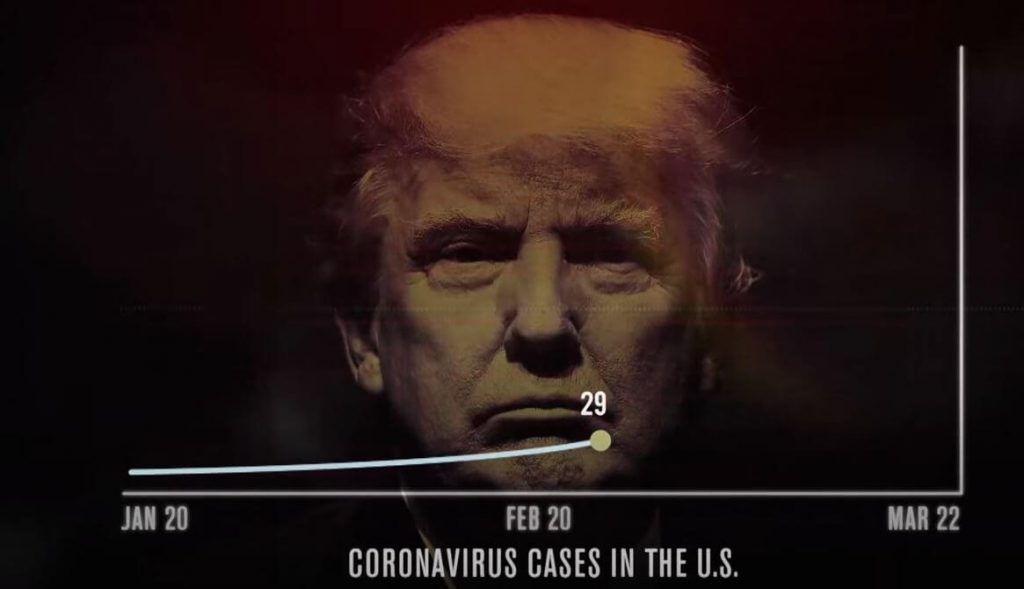Trump Suit Against TV Station Questioned
Lawyer for Rhinelander TV station that ran anti-Trump ad calls for suit’s dismissal: it’s the “highest form of protected speech.”

Screenshot from the Priorities USA ad “Exponential Threat,” the subject of a lawsuit brought by Trump’s campaign against a Rhinelander TV station.
The defamation lawsuit filed by President Donald Trump’s campaign against a small Rhinelander television station moved forward this week.
On Monday, lawyers representing Northland Television, LLC submitted further documents supporting their motion to dismiss the lawsuit alleging defamation that was filed on April 13 by Trump’s campaign against the Rhinelander TV station WJFW-NBC.
Trump’s campaign sued the northern Wisconsin station for airing an advertisement titled “Exponential Threat,” from the liberal political action committee Priorities USA. The ad is critical of the president’s handling of the COVID-19 crisis and shows the mounting numbers of novel coronavirus cases with Trump’s face in the background as it plays audio clips of Trump’s statements about the virus, including one where he uses the word “hoax.” In another audio clip, Trump says, it’s “one person coming in from China” and in another quote used in the ad he adds, “One day it’s like a miracle, it will disappear.”
The message uses statements made by the president to imply that Trump initially dismissed the pandemic and did not handle the issue well or truthfully.
“This advertisement fits squarely within the protections that the Supreme Court says all Americans have for political speech,” says WJFW’s lead counsel Charles Tobin, chair of the First Ame
“It is the highest form of protected speech because it involves political issues,” Tobin continues. “The Supreme Court has recognized that of all that in the hierarchy of free speech, political speech is the most important. The leading Supreme Court case involving political speech arose out of a political advertisement from the Civil Rights Era, in 1964 … The New York Times v. Sullivan.”
That landmark case established that the First Amendment protects media even if it publishes false information, so long as the media did not act with ‘actual malice.’ In that case the advertisement was taken out by civil rights leaders to raise funds to help their cause, describing an ‘unprecedented wave of terror’ by police against peaceful demonstrators in Montgomery, Alabama, and contained some false information.
The memorandum filed by the defense team this week provided further information and case law to support the motion to dismiss the plaintiffs’ complaint with prejudice.
“The Trump Campaign Committee readily admits that reasonable viewers of the political advertisement could conclude that, in choosing the word “hoax” to discuss COVID-19, President Trump “did not take the coronavirus danger seriously,” wrote the counsel for the station, which includes Madison attorneys Brady C. Williamson and Mike Wittenwyler of Godfrey & Kahn.
“Despite this concession, the Committee still asks the Court to deny the right of local television station WJFW to broadcast criticisms of the President’s handling of the gravest public health threat this country has faced in a century.”
Chilling political speech
Why go after Rhinelander when the ad aired across the country on many stations? It could be a scare tactic.
The Trump campaign counsel Alex W. Cannon sent the station a cease-and-desist letter on March 25, demanding it stop airing the ad called ‘Exponential Threat,’ saying it was a “patently false, misleading, and deceptive advertisement … paid for by the Priorities USA Action Fund (“PUSA”), a Super PAC formed by Barack Obama loyalists. PUSA stitched together fragments from multiple speeches by President Trump to fraudulently and maliciously imply that President Trump called the coronavirus outbreak a ‘hoax.’”
Having the ad pulled off the air or getting money out of a small Wisconsin television station are not likely the main reasons for filing the lawsuit, says Tobin.
If money were the goal of the suit, it would not have chosen a small station. And the ad has now been replaced by a number of newer ads by Priorities USA against Trump.
“The case also concerns the chilling effect that litigation like this can have on small broadcasters like WJFW. After all, if broadcasters get hit by candidates from any party with lawsuit after lawsuit, they have to spend a lot of money to defend them over and over again,” Tobin says. “They’re just going to have to decline to run these advertisements.”
McLeod did not respond to a request for comment, however in the brief filed in May, he wrote that the defamation claim against the defendant should not be dismissed.
“…the false, manufactured statement was comprised of manipulated audio clips stitched together to present the candidate saying a sentence he never said. That is the defamation. Given this clear evidence of fabrication, WJFW-NBC acted with actual malice in continuing to broadcast the PUSA ad after being provided the evidence of the falsification.”
The plaintiff further argues that the advertisement constitutes a “deep-fake” or using technological tools available at everyone’s fingertips today” to manipulate the news, which McLeod wrote are “rapidly polluting our information universe.”
The 49-page brief appears to only take issue with the first two of the nine statements in the first three seconds of the ad, which is shown on two screens, the first reading, “The coronavirus,” and the second reading “this is their new hoax.”
Asked what his first reaction was when he heard about this case, Tobin replies, “That this was a major smackdown against the right of broadcasters and the public to speak their mind about the administration’s response to the COVID crisis. The station needs a strong reaffirmation from the courts that they have a basic right to air dissent like this advertisement.”
Venue for the case
It was also determined this week that the case will remain in federal court. The Trump campaign’s lawyers originally objected to the lawsuit being heard there, but this week they “capitulated,” as WJFW’s counsel put it, so the case remains in the U.S. District Court for the Western District of Wisconsin.
Trump’s campaign filed the lawsuit against the Rhinelander station in April in Price County Circuit Court, but the case was moved to federal court — the U.S. District Court for the Western District of Wisconsin — in late April before WJFW filed a motion to dismiss the case in early May.
What will happen next? “The case is submitted to the judge on the briefs on our motion to dismiss,” Tobin says. “And we’re expecting a ruling from the court when the judge has time to carefully consider the issues.”
Reprinted with permission of Wisconsin Examiner.






















It’s interesting that the Trump campaign wanted the suit heard in STATE, rather than Federal, court. In State court, the partisan State Supreme Court would have the final word. In Federal court, the State Supreme Court would play no role at all.
The Trump campaign’s picking on a small radio station in a small town suggests that the Trump campaign is small minded. The fact that the T. Campaign prefers that the matter would be handled by the gerrymandered State Supreme Court rather than by the U.S. Supreme Court reinforces evidence of the T.C’s small mindedness.
Trump is a small man in a large body